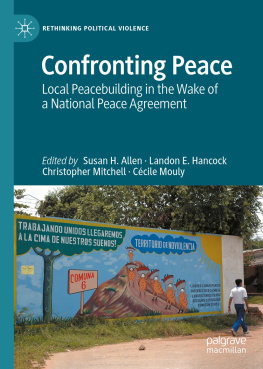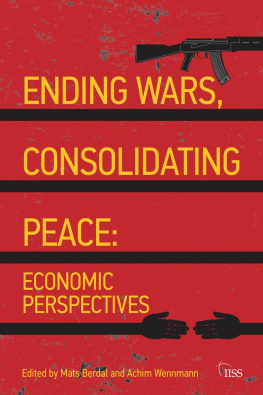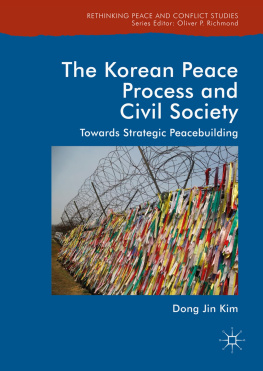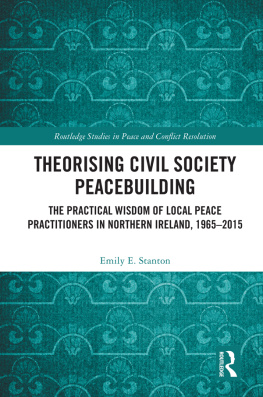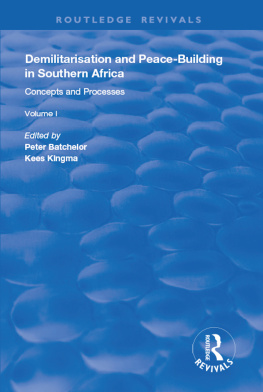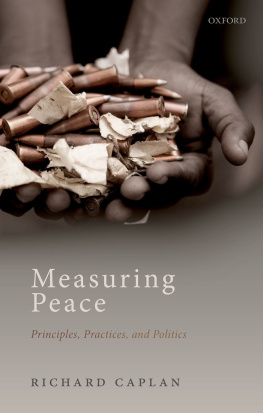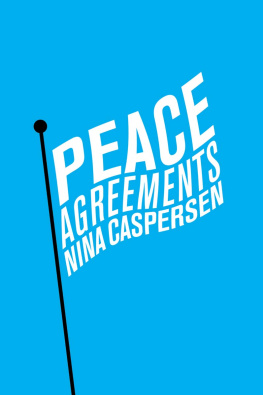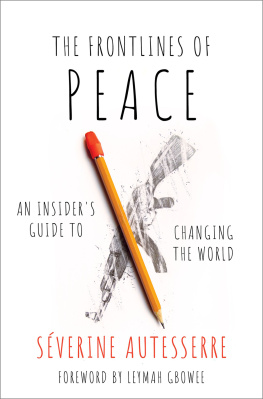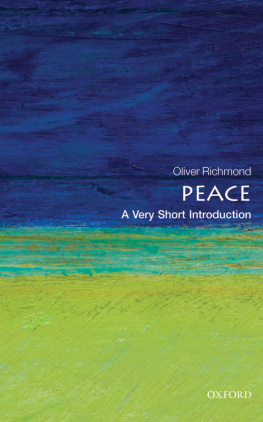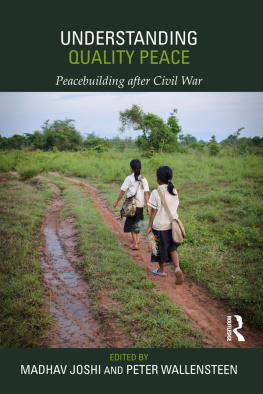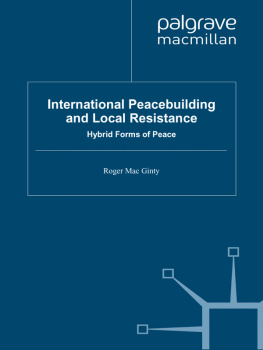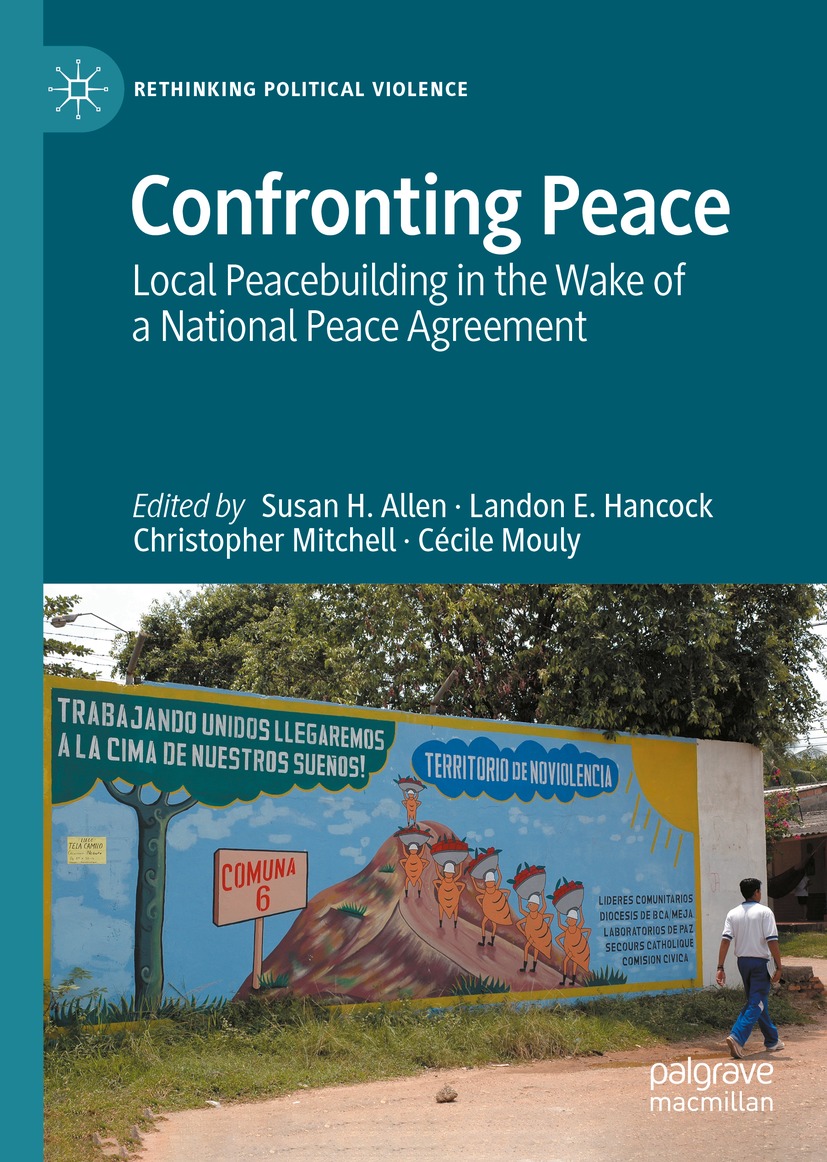Rethinking Political Violence
Series Editor
Roger Mac Ginty
School of Government and International Affairs, Durham University, Durham, UK
This series provides a new space in which to interrogate and challenge much of the conventional wisdom of political violence. International and multidisciplinary in scope, this series explores the causes, types and effects of contemporary violence connecting key debates on terrorism, insurgency, civil war and peace-making. The timely Rethinking Political Violence offers a sustained and refreshing analysis reappraising some of the fundamental questions facing societies in conflict today and understanding attempts to ameliorate the effects of political violence.
More information about this series at http://www.palgrave.com/gp/series/14499
Editors
Susan H. Allen , Landon E. Hancock , Christopher Mitchell and Ccile Mouly
Confronting Peace
Local Peacebuilding in the Wake of a National Peace Agreement

Logo of the publisher
Editors
Susan H. Allen
Jimmy and Rosalynn Carter School for Peace and Conflict Resolution, George Mason University, Arlington, VA, USA
Landon E. Hancock
School of Peace and Conflict Studies, Kent State University, Kent, OH, USA
Christopher Mitchell
Jimmy and Rosalynn Carter School for Peace and Conflict Resolution, George Mason University, Arlington, VA, USA
Ccile Mouly
FLACSO Ecuador, Quito, Ecuador
ISSN 2752-8588 e-ISSN 2752-8596
Rethinking Political Violence
ISBN 978-3-030-67287-4 e-ISBN 978-3-030-67288-1
https://doi.org/10.1007/978-3-030-67288-1
The Editor(s) (if applicable) and The Author(s), under exclusive license to Springer Nature Switzerland AG 2022
This work is subject to copyright. All rights are solely and exclusively licensed by the Publisher, whether the whole or part of the material is concerned, specifically the rights of translation, reprinting, reuse of illustrations, recitation, broadcasting, reproduction on microfilms or in any other physical way, and transmission or information storage and retrieval, electronic adaptation, computer software, or by similar or dissimilar methodology now known or hereafter developed.
The use of general descriptive names, registered names, trademarks, service marks, etc. in this publication does not imply, even in the absence of a specific statement, that such names are exempt from the relevant protective laws and regulations and therefore free for general use.
The publisher, the authors and the editors are safe to assume that the advice and information in this book are believed to be true and accurate at the date of publication. Neither the publisher nor the authors or the editors give a warranty, expressed or implied, with respect to the material contained herein or for any errors or omissions that may have been made. The publisher remains neutral with regard to jurisdictional claims in published maps and institutional affiliations.
Cover image: Sean Sprague / Alamy Stock
This Palgrave Macmillan imprint is published by the registered company Springer Nature Switzerland AG
The registered company address is: Gewerbestrasse 11, 6330 Cham, Switzerland
Praise for Confronting Peace
The wider field of peace and conflict studies has long confronted the challenge of ending wars. After thirty years of research tracking negotiations, mediation and agreements, perhaps nothing is more urgent than better understanding of the realities captured in this book. The challenge of confronting peace. The authors and the approach give the volume a deep legitimacy, as the key in this effort requires us to understand the specific processes and innovations needed to bolster and face the many faceted developments that emerge in the aftermath of peace processes and accords. These reflections, research and proposed recommendations offer empirical evidence and grounded learning for improving the chances that social and political transitions can offer both the hope of ending war and of solidifying the changes needed to sustain a more robust peace.
John Paul Lederach, Professor Emeritus, University of Notre Dame, USA
This fourth in a series of studies on the relationship between national and local level peacebuilding strategies is fundamental reading for scholars interested in what happens at the local level after a national peace agreement has been signed. A diverse group of pracademics in the peace sector from around the world reflect on how the problems that arise from national level peace differ from those confronting local communities. The editors provide a carefully cogent analysis of the case studies presented in order to give readers a highly applied, thorough and useful guide to the challenges and possibilities available to local actors in a post-agreement context.
Pamina Firchow, Associate Professor of Conflict Resolution and Coexistence at Brandeis Universitys Heller School for Social Policy and Management, USA
This book, with its impressive weaving together of peace practice and research, points to a potential new wave in conflict analysis and engagementmaking peace with conflict. That is, as the case studies in this book amply illustrate, post conflict peacemaking is rarely about the end of conflict. Rather, as illustrated in two main negative case studies, where peace agreements have so far failed to hold (in Colombia and the Philippines) and other cases of failed peace, seeking and pursuing peace in the face of ongoing conflict is about the daily engagement and commitment of local communities. This is a brave text about the benefits and perils if peace.
Jay Rothman, President, the ARIA Group, USA and Israel
Preface and Acknowledgments
We have been heartened by colleagues growing interest in local peace and in the stages of conflict that come after peace agreements. Peace is built and experienced locally, shaping individual lives. And, conflict continues in the days and years after peace agreements are signed. Here, we turn our attention to both the local peace and the post-agreement phase. What is the experience of local peace communities, after agreements have been signed? Addressing this and related questions has been a team effort, involving all the authors whose work appears in this book, as well as many additional colleagues.
The editors would like to thank the Carter School for Peace and Conflict Resolution (formerly the School for Conflict Analysis and Resolution) at George Mason University, and in particular the Center for Peacemaking Practice, for offering its facilities at Point of View in Virginia for the initial meeting that led to the idea of writing this book and for providing us with a small grant to make this meeting possible. Susan H. Allen would also like to thank the Carter School for her study leave, which enabled her to work on this edited volume, for funding her participation in a roundtable on the peace process in Colombia that took place in Quito, Ecuador, with the participation of various authors of this book, and for supporting research assistance by Michael Sweigert in the final stages of the manuscript production. Two members of the editorial team took advantage of this roundtable, supported by the Latin American Faculty of Social Sciences (FLACSO) in Ecuador and the office of the Friedrich Ebert Foundation in the same country, to organize a meeting with contributors writing chapters on Colombia and to further discuss the book. In addition to hosting the roundtable, Ccile Mouly would also like to thank FLACSO Ecuador for funding the research on Samaniego and her travel expenses to meet with other editors and some of the contributors at the conferences of the International Studies Association in Baltimore, San Francisco and Toronto.

